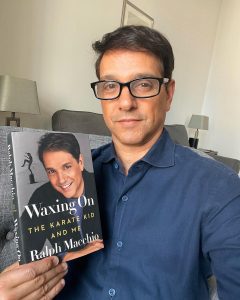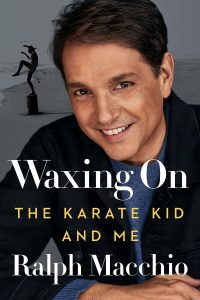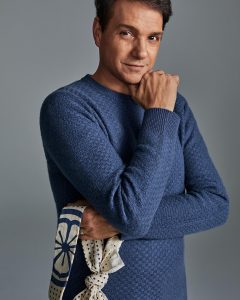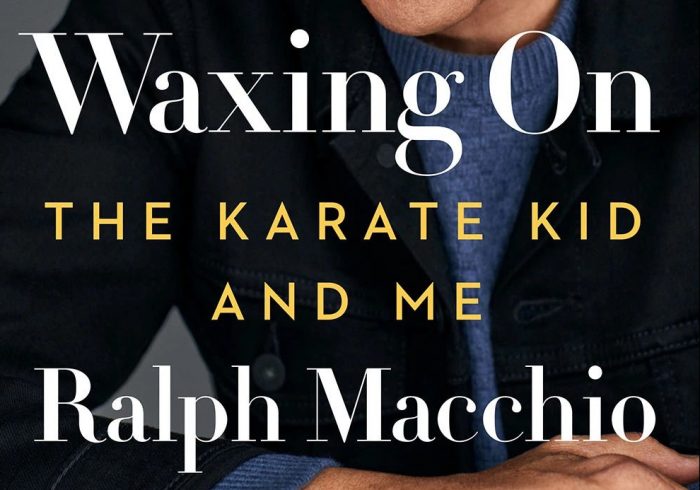Book Review: ‘Waxing On: The Karate Kid and Me’
Reviewed by Jeffrey Sanzel
Waxing On, subtitled The Karate Kid and Me (Dutton Books), is a smartly written memoir of the career-making role that raised Ralph Macchio from up-and-coming actor to teen icon. He shares his professional arc in the tightly written chronicle, emphasizing the Karate Kid trilogy and the current Cobra Kai. And while he accepts that Daniel LaRusso may have pigeon-holed him in the industry, he consistently expresses appreciation for the opportunity and the people he met along the way.

Before The Karate Kid (1984), Macchio appeared in a handful of films, most notably Francis Ford Coppola’s The Outsiders, as well as a recurring role on television’s Eight Is Enough (1980-81). He was living on his native Long Island when he landed the audition for The-Karate-Kid. Dubious, given the cartoonish title, he flew back to Los Angeles. He then began the round of auditions, callbacks, and martial arts training before being officially cast in the role (originally surnamed Webber but changed to suit Macchio’s “East Coast” quality).
Eventually, after reading with possible co-stars, producer Jerry Weintraub contracted Macchio for the original film and potentially two sequels. (Among noteworthy Daniel contenders were Charlie Sheen, Robert Downey Jr., C. Thomas Howell, and Kyle Eastwood.)
The Karate Kid’s screenplay took its inspiration from a newspaper article about a picked-on boy and how martial arts helped him deal with his bullies. The script relied on the twin themes of bullying and mentorship. The universality spoke to a large swathe of the potential audience and helped maintain its unflagging popularity for nearly forty years.
Macchio is a straightforward, entertaining storyteller, open and direct. Whether discussing the casting process that was months in limbo or the hours of physical training, his descriptions are vivid and personal, presented with warmth and gratitude.
He devotes three chapters to each of his co-stars: Noriyuki “Pat” Morita, who played Mr. Miyagi; Elizabeth Shue, his love interest, Ali Mills; and William Zabka, Daniel’s nemesis, Johnny Lawrence. He makes clear his love and admiration for the three individuals as actors, collaborators, and people.
 Morita, in particular, is singled out for his contribution. At the time, the actor was best known as a stand-up comedian and for his stint as Arnold on Happy Days. During his audition, Morita introduced the famous hachimaki (headscarf), explaining its significance. Along with the crane, the cloth became one of the film’s most memorable images. Eventually, Morita won the role of the Okinawan sensei, garnering an Academy Award nomination for Best Supporting Actor.
Morita, in particular, is singled out for his contribution. At the time, the actor was best known as a stand-up comedian and for his stint as Arnold on Happy Days. During his audition, Morita introduced the famous hachimaki (headscarf), explaining its significance. Along with the crane, the cloth became one of the film’s most memorable images. Eventually, Morita won the role of the Okinawan sensei, garnering an Academy Award nomination for Best Supporting Actor.
Macchio attributes much of the film’s success to Oscar-winning director John G. Alvidsen (Rocky, Save the Tiger, Lean on Me) and writer Robert Mark Kamen (Taps, Gladiator). He generously praises both men’s patience and support of the young actor, often recrafting the role around Macchio’s persona. “As an actor you often want to ‘disappear’ into a role. You feel you can demonstrate your range by losing yourself in the character. In this circumstance, ‘disappearing’ meant not being able to discern where Ralph ended and LaRusso began.”
He acknowledges The Karate Kid as a movie of its time, referencing John Hughes as well as Back to the Future. “There was an innocence, an adolescent openness and vulnerability, that we don’t often see as much in films today. Perhaps it was a simpler time. Perhaps it was a superficial representation, but it certainly had its place.”
Macchio reflects on the 1984 release at the height of blockbusters. The Karate Kid shared the same summer with Ghostbusters and Gremlins, just on the heels of Indiana Jones and the Temple of Doom.
The Karate Kid was a “small” movie in comparison. And yet, it landed big due to the approachability of the Daniel LaRusso character. “For whatever reason, I felt far more like a local hero and much less like a movie star. I was treated like the guy who won the high school football game on Friday night. The kid who lived next-door. Not a celebrity you would see on the red carpet or in magazines.”
For years, Macchio resisted a return to the franchise even though many ideas (some downright bizarre) were proffered. “Without actual material to judge, I wasn’t willing to take a next step and get involved, officially, on any project connected to The Karate Kid. It was always easier (and safer) to say, ‘No, thank you.’” He feared that anything that “missed the mark” would tarnish the legacy.
 He writes candidly about the 2010 remake, the How I Met Your Mother appearances, and the YouTube The Karate Kid: Daniel is the REAL Bully. He acknowledges these and other cultural moments kept the characters alive.
He writes candidly about the 2010 remake, the How I Met Your Mother appearances, and the YouTube The Karate Kid: Daniel is the REAL Bully. He acknowledges these and other cultural moments kept the characters alive.
Writer/creators Josh Heald, Jon Hurwitz, and Hayden Schlossberg changed his mind with the proposal of Cobra Kai. The team’s respect for the source and welcoming involvement of Macchio’s and Zabka’s insights and expertise helped the project progress. In 2018, the excellent series debuted on YouTube Red before finding a home on Netflix, with the fifth season released this past September.
Much of the latter part of Waxing On focuses on the new incarnation. The experience has been a joyful one: “I can’t express how much fun it is to play the yesterday in the today of these characters.”
Throughout the memoir, Macchio meditates on a range of topics, including the cavalier dismissal of Shue’s character between the first and second films, his scandal-free life, the impact of the crane kick, career dry spells, and even the filming of the famous fly catching bit.
As Macchio stated in a recent panel discussion: “When you make a movie that twenty or thirty years later people still obsess and debate about, therefore continuing to keep it relevant and important … it’s awesome!” In Waxing On, Ralph Macchio offers a welcome, often funny, and always engaging glimpse into the world of one of the most enduring family films.
Waxing On: The Karate Kid and Me is available at your local Barnes & Noble or online at www.barnesandnoble.com or www.amazon.com.







